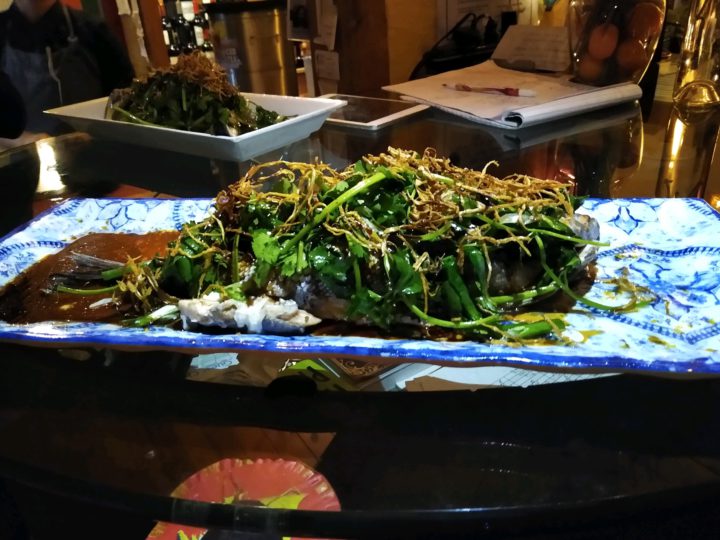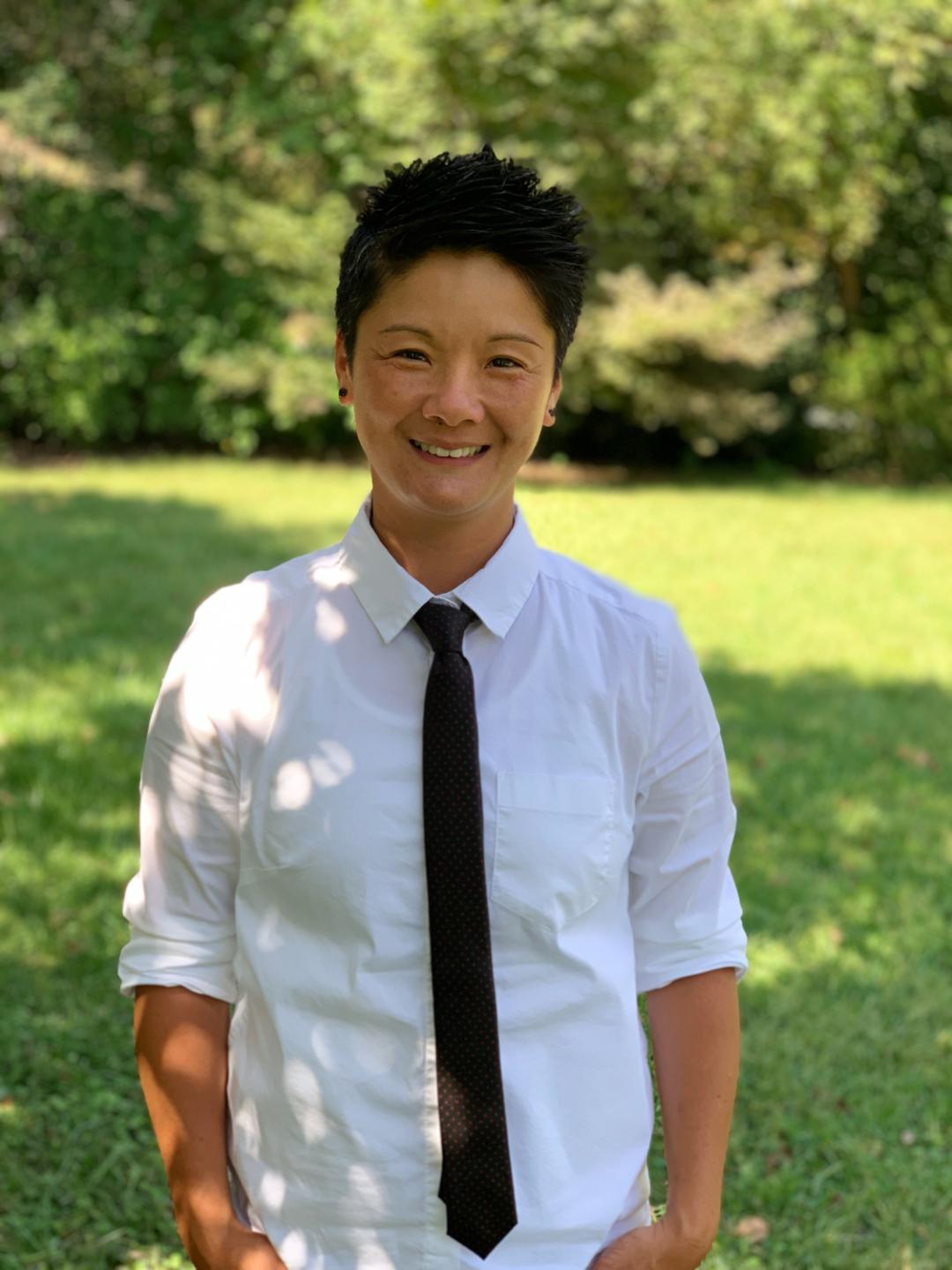On Jan. 27, the cozy, rustic dining room at La Guinguette in Black Mountain abandoned its usual French-Latin ambiance for one night in favor of a distinctly Asian theme. Paper lanterns and red-and-gold menus welcomed a full house of guests to chef J. Chong’s first Chinese New Year pop-up dinner, ushering in the Year of the Rat.
Each of the eight family-style courses served that evening held special meaning for Chong, both culturally and personally. The Toronto, Ontario, native, who uses she/her/hers pronouns, grew up in what she describes as “a very, very traditional, very strict” Cantonese-speaking Chinese family, where each dish offered during the holiday had a specific significance.
Accordingly, the pop-up’s menu was based on memories of dishes Chong’s mother and grandmother prepared during her childhood, each rich with intention for the coming year. The luxurious shrimp wonton soup, for example, signified wealth. The perfectly seared, garlicky gai lan broccoli was served for good health, and the unforgettably nuanced, lap cheong-accented pork dumplings (her grandmother’s recipe) represented family and prosperity.
“Chinese people are very superstitious, and we are very intentional when it comes to the Chinese New Year,” says Chong, noting that Jan. 1 typically came and went with little fanfare in her household as a child. “But we always celebrated the Chinese New Year, and it was a big, weeklong, sometimes 15-day thing.”
Her mother, she remembers, would cook the new year feast for friends and family. A table in the kitchen was covered with a red tablecloth and topped with oranges for good health, apples for wealth, red chopsticks and three teacups to represent spaces at the table for her ancestors.
“And she would light incense to respect our ancestors, and we would bow to them,” Chong recalls. “And every day before our meal, we would go to the table and show our respect. It’s a very traditional thing. It’s what I knew to do.”
Nostalgia for those elaborate celebrations and her family’s broader cultural food traditions has lately motivated Chong to create opportunities to immerse herself in and — fortunately for Asheville — share those flavors.
She’s hosted two pop-ups so far — the first was a wildly popular dim sum collaboration in late December at The Scarlet Bee with Bun Intended food truck and French Broad Chocolates executive pastry chef Beth Kellerhals. “People loved it, it was great,” she says. “Which makes me think Asheville people want really good Chinese food here.”
The ventures have offered not only an avenue for remembering the flavors of her hometown Cantonese community but have also given Chong a chance to stretch beyond the culinary parameters of her position as executive sous chef at Cúrate.
When Chong sat down to talk with Xpress in January, she had just returned from a stint at Cúrate’s two-month pop-up at Chefs Club in New York City. And before that, she experienced what she describes as “one of the highlights of my career to date” — cooking giant paellas for Cúrate side by side with world famous chef and Nobel Peace Prize nominee José Andres at Asheville’s inaugural Chow Chow food festival in September.
Although she’s found success as a chef, Chong’s path to a culinary career was far from straightforward. She left Toronto after high school on a soccer scholarship to William Carey University in Gulfport, Miss., with the plan to become a high school gym teacher. But after graduation, she felt she was “too immature to teach kids” at that point in her life, so she moved back to Toronto to work in banking.

In 2006, she met her future wife, Danielle Wheeler, on a visit to Baton Rouge, La., and soon moved there to be with her. Then in 2012, Chong, now 42, decided to pursue her love of cooking, and the pair moved together to Charlotte so she could attend culinary school at Johnson & Wales University.
“[Cooking] is just something I always loved doing,” she says. “Growing up, I watched my grandma do it, I watched my mom do it, and it was always such a communal thing — everybody came together in the kitchen. It’s like an expression of love.”
Chong’s marriage to Wheeler has added the distinctive flavors of Louisiana and Mississippi to her already diverse culinary wheelhouse. “They’re a big, tightknit family in Biloxi, Miss., and they love to cook,” says Chong. “How I kind of built the great relationship that I have with my father-in-law was in the kitchen because that’s what I’m good at, it’s where I’m comfortable, and he loves to cook, so we just started sharing recipes and tips, and we cook together.”
She recalls screwing up the first batch of gumbo she made for her wife 13 years ago by using a blond roux. “I was all excited, and I was like, ‘So, how do you like it?’ And she was like, ‘Oh, it’s OK.’”
Disappointed with the response, Chong asked her wife what she meant. “And she said, ‘There’s something missing. It’s kind of light,’” says Chong. “I learned I need a dark, dark roux. We laughed about that — her family later had a laugh about it, too.”
But her favorite ingredient to cook with — star anise — decidedly speaks to her own cultural roots. Although it’s a somewhat exotic and complex flavor for Western palates, she urges home cooks to experiment with the spice, adding it to anything from tea to chicken to homemade ice cream.
She offers a warning, however: “Go light. It’s like sesame oil; a little goes a long way.”
Beyond cooking, Chong says her greatest passion is supporting the LGBTQ community. Before Chong moved to Asheville four years ago, she volunteered with the nonprofit TimeOut Youth in Charlotte. And last year, she joined the board of directors for the Campaign for Southern Equality, a milestone that she refers to as “one of my proudest moments of 2019.”
Her own journey as a queer person of color has been enlightening and, at times, very painful. In what may seem like an unlikely choice to some, Chong opted to leave Canada to attend a Southern Baptist college in the American South so she would have an opportunity to come out as lesbian away from the judgment of her family.
It’s at this point in the conversation that the unflaggingly optimistic and spirited chef grows subdued. “I’ve talked to so many of my friends, and for the majority of us, that’s our story,” she says. “We choose to move far away so we can really be ourselves and have our family at a distance.”
She recounts coming out first to her older sister at age 19, then later to her parents after she graduated from college. Neither interaction went well. “It broke my heart,” she says. “My parents acted like I’d murdered somebody.”
Since then, her relationships with family members have continued to be harrowing. Her parents did not attend her wedding, she says, and are not currently in contact with her. “But it’s something that I learned to deal with and accept,” she says. “It wasn’t always easy.”
As far as her career, she recalls some unsavory challenges working in Charlotte’s restaurant industry as a queer Asian woman — and one, she notes, who is of very slight physical stature. (“Charlotte was more like a ‘boys’ club,'” she says.) She finds Asheville to be much more progressive, although she acknowledges that she’s fortunate to work for Cúrate executive chef Katie Button, “a female chef who is very focused on providing equal opportunity for everyone.”
She still sees room for improvement in Asheville, though. “I think Asheville could start to support the queer community just a little more,” she says, citing a need for greater backing for the area’s numerous LGBTQ-focused nonprofits.
Chong also urges people to be aware of pronouns and not make assumptions. “If you’re unsure about a person’s pronouns — you know what? Ask. Educate yourself,” she says. “Don’t be fearful.”
Looking forward, she says more pop-ups are on the horizon, but plans are still in the works. She also hopes to someday figure out a way to combine her passion for cooking with her interest in working with LGBTQ youths.
“I don’t know what that looks like, but I think it’s going to happen somehow,” says Chong. “I’m excited to see what that looks like.”
For updates on future pop-up events from J. Chong, contact the chef at jchongeats@gmail.com or follow her on Instagram at @jcjc_10.




Why was it necessary to clarify for the reader that this person uses “she/her” pronouns? A reporter should ask the person and then simply use that in the article, instead of virtue signaling by calling attention to the fact that the chef was asked.
Yeah, that bugged me as well
Thank you for reading the story! The chef requested that I clarify her pronouns.
If the chef told you she wants to be addressed as “she,” then simply do that. To clarify for the reader that you’ve obtained her permission to be called “she” is virtue signaling and completely unnecessary.
Thank you for the feedback. Ms. Chong specifically asked me to introduce her pronoun in exactly the way that it was presented in the story. This is not what I would normally do, but I didn’t have a problem with honoring her request.
Are her dumplings in any retail outlet during the winter?
What is the name of your cookbook?
I can’t wait to purchase it. I think your awesome!!!